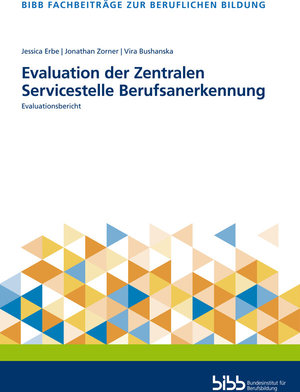
Evaluation der Zentralen Servicestelle Berufsanerkennung
Evaluationsbericht
von Jessica Erbe, Jonathan Zorner, Vira BushanskaAm 1. Februar 2020 nahm die Zentrale Servicestelle Berufsanerkennung (ZSBA) für zunächst vier Jahre ihre Arbeit auf. Als Begleitmaßnahme zum Fachkräfteeinwanderungsgesetz berät und unterstützt die ZSBA im Ausland befindliche Fachkräfte, die in Deutschland arbeiten wollen, bei der Anerkennung ihrer beruflichen Qualifikationen. So soll das Anerkennungsverfahren für die Fachkräfte transparenter und effizienter werden. Das soll zugleich die für die Berufsanerkennung in Deutschland zuständigen Stellen entlasten. Anhand von Individualdaten der ZSBA und eigenen quantitativen und qualitativen Erhebungen bei Beratenen, Beratenden sowie Mitarbeitenden von zuständigen Stellen und anderen Beteiligten hat das Bundesinstitut für Berufsbildung untersucht, inwieweit die Servicestelle diese Ziele nach rund 2,5 Jahren Tätigkeit erreicht. Der Evaluationsbericht dokumentiert, dass die ZSBA in diesem Zeitraum knapp 10.000 Personen betreut hat. Sie stammen größtenteils aus Drittstaaten und sind häufig in Gesundheits- oder technischen Berufen ausgebildet. Die meisten äußern sich zufrieden mit dem Service der ZSBA. Diese ist als neuer Akteur etabliert, füllt eine Lücke im Beratungsprozess und wird von einem Großteil der zuständigen Stellen bereits genutzt. Der Bericht beschreibt auch Optimierungspotenzial und enthält Handlungsempfehlungen, beispielsweise hinsichtlich muttersprachlicher Beratung, Sichtbarkeit und Verteilung der Fachkräfte über das Bundesgebiet.On 1 February 2020, the Central Service Point for Professional Recognition (ZSBA) began its work for an initial period of four years. As an accompanying measure to the Skilled Workers Immigration Act, the ZSBA advises and supports skilled workers abroad who want to work in Germany in the recognition of their professional qualifications. This is intended to make the recognition procedure more transparent and efficient for skilled workers. At the same time, this should relieve the burden on the offices responsible for professional recognition in Germany. Using individual data from the ZSBA and its own quantitative and qualitative surveys of guidance counsellors, guidance officers and employees of competent bodies and other stakeholders, the Federal Institute for Vocational Education and Training has investigated the extent to which the Service Agency has achieved these goals after around 2.5 years of operation. The evaluation report documents that the ZSBA has assisted almost 10,000 people during this period. Most of them come from third countries and are often trained in health or technical professions. Most of them express satisfaction with the service provided by the ZSBA. It is established as a new actor, fills a gap in the counselling process and is already used by a large part of the competent bodies. The report also describes potential for optimisation and contains recommendations for action, for example with regard to counselling in the mother tongue, visibility and distribution of professionals across the federal territory.






